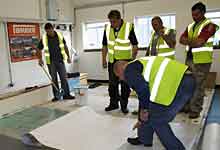Training is the Key to Success
Peter Stonebridge, single ply product manager at Bauder Ltd talks through the importance of valuable training.

If we don’t have the skills to do it, common sense tells us that a job is not only going to be difficult but also risky and costly. Being properly trained gives expertise and confidence to do the job.
Training improves capability, capacity and performance.
Contractors who undertake any installation, whatever the product, should make sure they have the skills to complete the task. You need to ensure your labour force is trained and skilled in the installation of the product and don’t be afraid to seek help and assistance from the product’s manufacturer if in any doubt.
With the installation of single ply roofing systems, it would be foolish to ignore the experience skilled operatives have as the knowledge they can impart is invaluable. They can assist and support colleagues on site when a particular detail is causing an issue. However, some may have picked up behaviours that may be detrimental to the success of a watertight roof, and it is these ‘bad habits’ that will eventually reduce the long-term skill set of a new generation of roofing installers.


Training is, and should be, a whole lot more than just turning up at a venue for a couple of hours before being registered as approved. There are many bad examples of ‘training’ but one of the worst has to be the issuing of a DVD with a membrane to show techniques that were specific to the particular membrane. The value of such instruction is extremely questionable and doesn’t even confirm, let alone guarantee, that the installer will even watch the DVD.
The instruction of an installer should not be viewed as a one off. Continual monitoring and assessment of trained operatives is the key to delivering quality results each time, on every roof and, as an industry, we should not shy away from insisting on refresher training through an operative’s career.
Bauder, one of Europe’s leading manufacturers of waterproofing membranes, understands the investment required to ensure that a roof installation is watertight and will remain in service in excess of its life expectancy. Training, on site instruction and monitoring are crucial to guarantee quality assurance. The move to new headquarters in Ipswich has allowed Bauder to expand and develop its training centre. Now a bespoke venue has been created, with all the facilities required for off-the-job training. This allows learning to be undertaken away from normal work situations, such as a construction site, with the advantage that it enables people to concentrate more thoroughly on the training itself. This type of training has proven more effectivein coaching concepts, techniques and ideas.
Bauder prefers to train a maximum of six operatives at a time. Two fully qualified and experienced site technicians deliver the syllabus which allows for plenty of individual attention. Bauder has two separate courses, one covering PVC systems and the other the Flexible Polyolefin (FPO) systems. Even though this is off-the–job training, everything is geared towards having a practical, hands-on approach using demonstration rigs to replicate rooftop situations. The courses cover, amongst other things, the different welding techniques, individual system installation, general detailing and roof penetrations, adhered or mechanical fixed options, pre-formed metal and corners.
Following the successful completion of a one-day refresher course, or other longer bespoke training sessions, the operatives will be visited on-site for on-the-job training in their normal working situation, again using the actual tools, equipment and Bauder membranes and accessory materials. On-the-job training has the additional benefit of reinforcing and understanding the skills and techniques gained in the training centre and is delivered by one of the ten national site technicians employed by Bauder. The site technician will also assess any operative for future and further training.
The importance of a skilled and trained contractor workforce is the future of the roofing industry. The allowance of non-trained operatives to install products with sub-standard results will ultimately lead the industry down a path of poor workmanship and poor reputation.